Clearly I Would Offer to Produce Elisa Albert's Baby
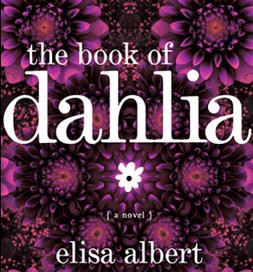

The final story in Elisa Albert’s debut collection How This Night Is Different is in the form of a letter to Philip Roth from “Elisa Albert.” In it, the author — or her alter-ego, or whatever — offers to bear the aging, famously childless author a son or daughter. It’s a joke, and it isn’t. It’s hilarious either way. And for (h/t Julie Klausner) Jewish Girls who have considered suicide when Zuckerman Unbound was enuf, reading it produces the uncanny sensation of having had the top of one’s head unscrewed and one’s brain contents poured directly onto a page, which one is somehow then reading. I mean, who hasn’t thought of offering herself up as a gestational surrogate to Philip Roth? (Um.)
“I’ll just tear a page from the Roth playbook and simply turn this letter into a kind of postmodern ‘story’ (and I’ll even leave this part in to further confuse and complicate, to experiment with implication myself, the ‘Elisa Albert’ alter-ego, in all these ways you yourself are so adept with, see how it feels, how you must feel, when people assume fact is fiction and fiction fact),” she writes.
Elsewhere in the letter she alludes to her own body of work — “half a dozen years of crafting clever little ten-pagers featuring women sitting shiva for relatives who had molested them, women sucking their first uncircumcised cock (then going out for bacon cheeseburgers)” — and her limitless ambition. She spent most of a year, she tells Roth, writing a “Great American Jewish Novel” novel about the Triangle shirtwaist fire — “I was out for some Safran Foer blood, man” — only to find herself scooped, hilariously, tragically, by Alana Orenstein. Then a long relationship ended. At the end of her tether at 26, feeling “ripe… about to rot,” Albert (“Albert”) ended up writing a letter that ticks briskly through Roth’s oeuvre, shifting all the while in tone from worshipful to crass to matter-of-fact (“If you’d been born to ever-so-slightly different first-generation Jews and raised on Long Island you’d be Billy Joel, okay dude? So don’t be so goddamn hard on everyone.”) and all the while never deviating from its stated purpose: putting the offer on the table, offering up her uterine real estate to produce the scion of a genius. This is Elisa Albert in a nutshell: funny, self-aware, and genuinely fearless that she might be a lunatic, or a genius, or both.
How This Night Is Different doesn’t actually contain stories about post-uncut-BJ bacon cheeseburgers, but it does have a story about a thirtysomething harried new mom smoking pot with 13-year-olds at a Bat Mitzvah and another about a woman, home for Passover, who worries that her vividly-described yeast infection (and I mean viiiividly: “white, pasty, not altogether too heinous smelling, considering”) renders her presence at the Seder unkosher (she fears that she qualifies as leavened). The cover of the paperback features a Kiddush cup. The “inevitable debut novel” that Albert describes in that epistolary final story focuses, not on the Triangle shirtwaist girls, but on a more contemporary tragic heroine: a trust-funded, going-nowhere daddy’s girl, too strange and potheaded to properly be considered a JAP, who learns at 29 that her wholly meaningless life is about to be cut short by inoperable brain cancer. Its paperback features flowers (the heroine’s name is Dahlia).
The Book of Dahlia, published in 2008, established Albert as one of our most exciting and promising young American writers. The delicate balance of difficult emotional truth, absurdist shtick and hilarious raunch that she perfected in How This Night Is Different is on display in Dahlia, plus a deeper understanding of human nature and a more developed eye for detail. Albert delves headfirst into Dahlia’s tortured childhood and adolescence, describing heartwrenching scenes without bathos or much commentary. (”You got so fat,” teen Dahlia’s monstrous, mostly absent Israeli mom declares when she greets her at the airport, where she has arrived (late!) to halfheartedly assume custody of her daughter for a summer.) By structuring the book around the dictates of a self-helpy guide to beating cancer, Albert provides herself with many opportunities to mock the cheesy truisms that people feel forced to dispense in the face of terminal illness; she takes them, but she also finds meaning in unlikely places. Dahlia, nearing death, gains clarity on her life even as her brain literally degenerates. On being told that “there are times in life when it’s crucial to let go of anger,” Dahlia rolls her eyes: “Anger wasn’t something you could let go of. Anger held fast to you, not the other way around.” By the time the death that’s been foretold since page one finally occurs, Dahlia is such a fully real character that the reader actually grieves for her; remembering the earlier chapters feels like remembering a lost friend.
I don’t know how well Albert’s books have sold; Dahlia, I know, got some really great reviews, though it was overlooked (criminally! Appallingly!) by the Times. I do know that I find myself recommending it, to blank stares, to people who’ve certainly read the young Jewish author whose “blood” Albert declared herself to be out for in her first collection. This is the opposite of the way things ought to be.
Maybe the flowers and Kiddush cups are to blame; though these books are about Jewish women, mostly; they are not for Jewish women exclusively. (Really!!) Her latest work has been as editor of an anthology, Freud’s Blind Spot, about siblings, and it features her own work and that of Rebecca Wolff and Etgar Keret; I haven’t had a chance to read it yet but it seems great. She will write more and more novels, I hope. A Rothian abundance of them would be too few.
* * *
“The Smartest Thing She Ever Said” is a Tumblr based digital storytelling art project featuring four teams of two-one artist and one story editor-between now and the end of the year. For three weeks each, the teams were asked to interpret the phrase, “The Smartest Thing She’s Ever Said.” The current team features writer Durga Chew-Bose and photographer Katherine Finkelstein with support from project curator Alexis Hyde. ArtSheSaid.com and its artists are entirely supported by Ann Taylor in collaboration with Flavorpill.
See the story unfold HERE.
Emily Gould runs the Internet’s only cooking book-chat TV show. Also, Elisa Albert is reading in Los Angeles on December 6.
See? You Do So Put the Yogurt "Up There"

There are many times in my life when women have argued with me, “You don’t actually put the yogurt in your vagina to treat a yeast infection! That’s crazy!” And I’m always like, “Yes, girl. You do. Trust me, I grew up in California.” And now there are actual twin nurses with an advice column backing me up. (Also may I reccommend Old Chatham Sheepherding Company’s yogurt? For eating or otherwise. It’s the best yogurt on the planet!)
The Thanksgiving Day Only-Fantasy Football League
by Jeff Johnson and David Roth
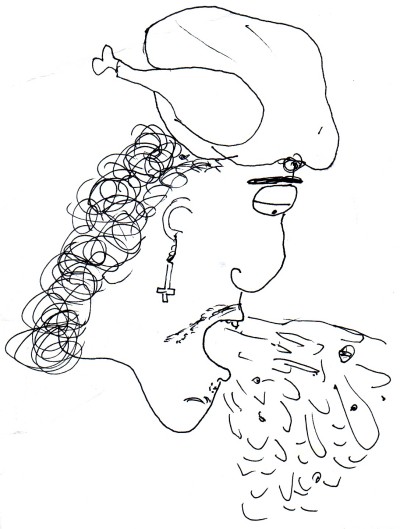
You’ve always wanted to try fantasy football, but you were worried that doing so would make you irresistibly attractive to members of the opposite sex. At work, people knowing you even dabbled in fantasy football would mean you’d be stuck taking regular breaks to accept on-the-spot sexual favors. Or, failing that, you keep meaning to watch the Detroit Lions lose by three scores on Thanksgiving afternoon, but are torn because sitting in a turkey-rank dining room drinking too sweet wine, talking about “life” with friends and family members is equally compelling.
This all gets fixed today.
Now you can live your fantasy football GM dreams and wake up on Friday without actually having to be someone with a fantasy football team. Now, finally, you will have something to “share” with dear friends and family on this day, and it won’t involve some musty board game or pet-chewed Jenga pieces or doing dishes together while listening to The Corrs. Together you can all sit and see if Shaun “Mayflower” Hill can hurl the touchdown pass that will bring your father-in-law to silent, fist-chewing tears. Download the following PDF, share it with your friends/hated family members ASAP and get drafting the one-day only Thanksgiving Day Fantasy Team that will change the dynamic of this blessed day… uh… beyond repair.
David Roth co-writes the Wall Street Journal’s Daily Fix, contributes to the sports blog Can’t Stop the Bleeding and has his own little website. And he tweets!
Jeff Johnson tweets here. He is also responsible for doing weird things with old sportscards here and here.
A Q&A with 'Electric Literature'
by Seth Colter Walls

In the summer of 2009, Andy Hunter and Scott Lindenbaum published the first volume of their literary journal, Electric Literature. By offering more than the paperback option — in fact, by making their journal available on multiple mobile devices — its founders have not only built a reputation and a business: they’ve also been able to pay writers $1,000 per story.
Q: You still pay well for the stories you publish, and so you’ve attracted big names like Rick Moody, Lydia Davis and Javier Marias. Has it been a challenge with their agents to get agreements to publish across every medium?
A: One thing we come up against again and again, in the industry, is that everyone is at a different point with their assumptions. You’ll get an agent saying “oh we love what you guys are doing; we want you to publish one of our authors.” Then they pause over the international electronic rights. But, you know, electronic rights, by default, are not bound to space. It’s confusing for them, because they’re trained not to give away anything for free — and to sell other rights again and again. So they’ll ask, “What, are you going to make a video game out of this?” And, I don’t know, you have to say: “You may be slightly confused about the demand for a video game based on the work of Javier Marias. Like: don’t worry, this is not going to cannibalize your hardcover sales in Spain.” But it also makes sense; everybody’s afraid of “doing it wrong.”
(Sponsored posts are purely editorial content that we are pleased to have presented by a participating sponsor, in this case American Express Open Forum; advertisers do not produce the content.)
Irish Crisis Succinctly Explained
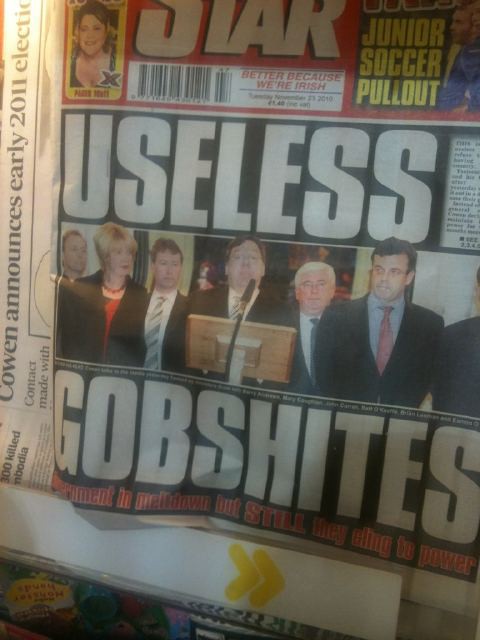
The Guardian congratulates the Irish Daily Star on that paper’s “nuanced analysis” of the current bailout issue. We have to agree. [Image via]
Harry Potter and the Incredibly Conservative Aristocratic Children's Club
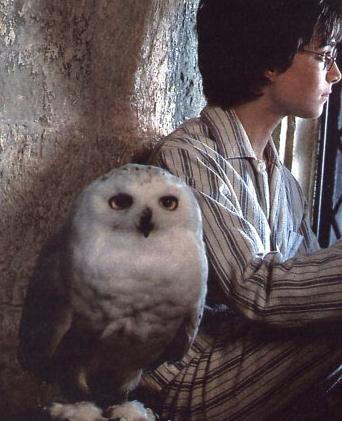
The richly imaginative details of J.K. Rowling’s fictive world, it must be admitted, are pleasurable. The hot-rod brooms, the flowing robes and flying cars, the goth Heaven of the sullen Slytherins, the snake language and the magic wands enclosing phoenix feathers or unicorn hairs, the metamorphic potions, the leaping or fizzing sweets! All these have been fully and lovingly realized in the Warner Brothers movie adaptations of the Harry Potter books, including the most recent, which is a fine-looking but completely incoherent mess with a morally bankrupt and politically repugnant story at its core.
No expense has been spared, naturally; Warner Brothers has seen $5.7 billion out of these movies in theatrical revenue, so far. The visual imagination of director David Yates (he has helmed Harry Potter 5 through 8) is kind of pedestrian but there are some lovely set pieces, notably an animated vignette that is just so beautiful and interesting. The movie was bound to be entertaining, a spectacle, provided you don’t look too closely at what’s being said.
The multitude of sins committed in Rowling’s imaginative but horrible story can be roughly divided into three classes: ethical or pedagogical, literary and political.
Some years ago I was driving a carful of kids to some practice or party, and from the crowded back seat I heard one breathlessly ask the others, “When you were little,” (they were maybe twelve at the time), “did you think you were going to get a letter from Hogwarts?”
Giggles arose in the car, some lofty and some sounding a little embarrassed; a couple of the kids admitted that they had in fact fantasized about receiving such an invitation. (When you are chosen to attend Hogwarts, the public school for wizards attended by Harry Potter, an owl shows up with a letter informing you that you are one of the lucky ones.) This concept of “chosenness” has always put me off the Potter books because it seems so harmful for kids, even though I am a lifelong SF/fantasy fan (a genre where this crops up frequently, to be sure).
In the world of Harry Potter, rules are for the little people. The “wisest” adult, headmaster Albus Dumbledore, showers magical gifts and indulgences on his favorites and lets them break every rule because they are so special, better than all others. How come they are so much better? Well, the general awesomeness and favoriteness of Harry Potter and his friends is mostly arbitrary, the result of the chosenness itself, rather than of effort or application. Harry Potter is just naturally fantastic at flying around on a broom and conjuring illuminated stags up out of his soul and things, Hermione Granger is just naturally the most brilliant student Hogwarts has ever seen, and so on. Ron Weasley, the impoverished aristocrat, is a Sancho Panza-like figure whose rough common sense is meant to keep Harry on the straight and narrow; his noble blood is his “chosen” quality, and marks him, too, as an unimpeachable Establishment figure.
Which brings us to the disconnect between reality and appearances regarding the nonconformity that Rowling so hamfistedly praises at every turn. Harry Potter and his friends, far from being renegades, are in fact slavishly obedient to the all-powerful, omniscient, do-no-wrong Dumbledore. And why not, when he provides them in advance with every rare and fabulous magical gewgaw and hint they will ever need in order to extricate themselves from whatever peril they may find themselves in.
Rowling’s adherence to the old English principle of blood-nobility — that weird but deeply held superstition that has caused countless English protagonists to discover that unbeknownst to them, they were peers of the realm all along — is in stark contrast to the biggest conflict depicted in the Potter stories, the blood purity conflict. The bad guys, Voldemort and crew, are race purists, anti-Muggle (meaning anti-human), which is to say that they are against any magical Muggles or intermingling of Muggle blood (“Mudblood”) and wizard blood. Yet Rowling’s heroes are all noblemen, with the exception of one: Harry Potter learns in the old-fashioned surprise way that his father was a fabulously rich wizard, and his godfather is a rich aristocrat, too; Ron Weasley is a nobleman of the purest blood, though poor. The sole pure-Muggle wizard of any consequence at all in these books is Hermione, the author’s personal projection of herself (there are two other minor pure-Muggle wizards, boys, both of whom are bumped off). So this story can be read pretty effectively as an explanation of why J.K. Rowling should be allowed to hang around with the nobility (she is smart, is why).
Maybe, incidentally, the reason no other woman as smart as Hermione appears in the books is that J.K. Rowling, like the Turk, can bear no sister near the throne. Her volcanic ego burns down everything in its path. Where the Twilight books are works produced from and for a state of sexual yearning and frustration, Rowling’s “wizarding world” is a fantasy place created for the benefit of Hermione Granger, for her infinite sagacity, foresightedness and teacher’s-pet-hood to be rewarded at every turn.
In any case it is a horrible thing to be teaching children, that you have to be “chosen”; that the highest places in this world are gained by celestial fiat, rather than by working out how to get there yourself and then busting tail until you succeed. If the “special” and “chosen” and “gifted” automatically receive all the honors there are, then what would be the point of working hard to achieve anything? So it is really terrible to hear these twelve-year-old kids so smitten with the idea that fulfillment would literally fly to them out of the sky, via owl.
Rowling is a self-avowed liberal who gave a million pounds to the Labour Party in 2008, but her values are Tory through and through. In her books it is the hoary old white guys who run everything; women are popped in here and there for liberal flavor. The tokenism is unbelievable.
Rowling named her first child after Jessica Mitford, the lefty Mitford sister (as opposed to the Nazi-sympathizing ones). Rowling often says she read Mitford’s Hons and Rebels at age fourteen, and that it affected her profoundly; this book in fact provides a perfect illustration of Rowling’s political disconnect, because Jessica Mitford was the daughter of the second Baron Redesdale, a “terrific Hon,” as the Mitfords would have said. She was a super-blue-blood with rebelliously liberal views. It’s exactly this privileged, elitist compassion-from-on-high that Rowling admires and has consistently depicted in the Potter books. But the liberal values, the openmindedness, the diversity, are all fake.
I am no fan of Ann Althouse, but I had to admit to a shudder of recognition when I read her criticism of liberals last week:
What is liberal about this attitude toward other people? You wallow in self-love, and what is it you love yourself for? For wanting to shower benefits on people… that you have nothing but contempt for.
This may not be such a very good description of liberals in general but it is an excellent description of J.K. Rowling. In the “touching” climactic scene in Harry Potter and the Deathly Hallows, the house-elf Dobby has been “liberated” by, and now sacrifices himself to save, Harry Potter & co. The house-elves as depicted in the movies are horrifyingly pathetic, small, cringing, grateful; the sad, brave little creature Dobby literally expires with the name of Harry Potter on his lips. It’s like freedom is the gift of the chosen ones to bestow, and those thus benefited can die of gratitude and be “properly buried,” which really, there is this long burial scene complete with Harry Potter and shovel. It’s a perfect illustration of the “liberal condescension” that conservatives are always yodeling about, and it made my hair stand on end.
So don’t think about that! Think instead of the strapping young buck Rupert Grint, a fine young actor who manages to rise above the tawdry, maudlin script, or even more, of Helena Bonham-Carter as the queen of the goths, Bellatrix Lestrange, whose gorgeous performance had me totally rooting for the bad guys, as usual. She’s always got a magic wand or a knife at someone’s throat, that girl. Alan Rickman as Severus Snape, too, is as seductive as ever. Just to hear his voice for me is easily worth the price of a movie ticket; really he could read the phone book aloud, for all I care.
The most conservative element of Harry Potter’s world is that it is a materialist paradise, full of costly and rare magical artifacts, invisibility cloaks and piles of “wizard gold” at Gringott’s Bank. Things, that you can make toys out of, things that you can worship and desire and buy. There’s nothing in this story of alleged iconoclasts and rebels that would present the slightest challenge to the establishment. That’s why the story dovetails so easily into a series of Hollywood blockbusters.
The Rowling story of the Single Welfare Mom Who Made Good is not exactly accurate, either; her background is solidly middle class, her dad was a Rolls-Royce engineer, she read French and classics at Exeter, and the father of her first child (whom she divorced, rather than the other way around) was a Portuguese TV personality.
So this good liberal’s face is absolutely the face of the corpocracy. The number of lawsuits brought all over the world by Rowling and Warner Brothers against practically anybody who would dare to slap the Potter moniker on so much as a work of fanfic would curl your hair. Well, finally she allowed this one guy to write a fanfic novel, after having threatened to sue, perhaps because she knew she wouldn’t have won. If it were up to J.K. Rowling, I think Jean Rhys would have been thrown in jail for daring to write Wide Sargasso Sea. Which is fanfic, too, come to that.
In the best-known and most terrible of these lawsuits, the proud liberal Rowling saw fit to sue a fan who’d devoted years of his life to making an online encyclopedia about her books. I don’t believe I’ll ever cry again over the plight of an alleged copyright violator but you never know, I guess. Steve Vander Ark wept openly himself when he testified at the trial, and even though Rowling personally sued him, he later wrote on the blog part of the Harry Potter Lexicon — just like a house-elf! — that he was “still Jo’s man, through and through.” It just breaks your heart, the integrity and gentleness of this man, the love he bears these wretched books, the way he was so wrongly disgraced. A shorter version of Vander Ark’s book finally did see the light of day, in 2009.
On the literary side, suffice it to say that Rowling is ferociously dull and long-winded, that there is no suspense, that she kills people off (nobody Chosen, though) simply in order to show how serious things have become; magical artifacts are produced, used once for the specific purpose for which they were invented and then never seen again; the bad guys, whose actual aims are hopelessly opaque, have got the immemorial bad-guy cluelessness regarding the element of surprise, they let one opportunity after another to bump off our heroes slip past them, etc. Christopher Hitchens’s 2007 review in the New York Times is generous, but pretty searing, too. (“The repeated tactic of deus ex machina (without a deus) has a deplorable effect on both the plot and the dialogue. The need for Rowling to play catch-up with her many convolutions infects her characters as well.”)
Anybody should write whatever he or she pleases, of course, and there’s no doubt that Rowling did something right in creating her fictional world of Quidditch and faux-Latin magical incantations, if only because so many people love it so dearly. But if you have a young Harry Potter fan in your orbit, you might steer him or her toward Philip Pullman, whose Dark Materials trilogy is genuine in every way that Harry Potter is false; a fully realized work of fantasy to rival Tolkien in its wisdom, inventiveness and questioning. Because Pullman’s novels really do threaten the establishment view of religion and institutionalized coercion, because they are really subversive in the manner in which Harry Potter pretends to be, the Hollywood establishment chickened out completely and made a perfect hash of the first Pullman movie. Tom Stoppard, who’d adapted the original screenplay, was dumped by director Chris Weitz (of American Pie fame), who preferred to write his own. Hollywood is, unfortunately, an absolute tool of the corpocracy, and will never be equal to any story that presents a legitimate threat to conventionality or to materialist values.
Maria Bustillos is the author of Dorkismo: The Macho of the Dork and Act Like a Gentleman, Think Like a Woman.
Class Conflict And Fine Dining
“The Dining section is not a tip sheet or a guide to dining on a budget. There is certainly a service dimension to the coverage, but primarily it reports on the news, and the critics perform the same function as our drama, book, and music critics. Yet cost objections do not seem to hound those folks the way they do the restaurant critics. The Met is very expensive, yet we cover all Met productions without any sense of guilt. Yankees tickets are expensive, but we do not balance out the coverage by reporting on fewer Yankees games and more Cyclones games. We follow the news.”
— Former New York Times restaurant critic William Grimes defends the paper from a reader who has “grown dismayed by the reviews of restaurants that the vast majority of New Yorkers cannot afford to patronize.”
Tom Waits, Poet
“Tom Waits is to publish his first book of poetry, in collaboration with photographer Michael O’Brien. Hard Ground is described as a portrait of homelessness, combining Waits’s words with images of people who ‘live on the hard ground’.” The book comes out in March. [Via]
The MFA Student: "Bitterness Is the Emo Cousin of Entitlement"
The New School’s MFA writing students are learning! “Provided they’ve been paying attention to the world outside the workshop, they’ve noticed that the conversation about what it means to be a certificated ‘writer’ has shifted away from the literary, and even the lofty, and is now taking place in the rather harsher language of political economy.”
Cheer Up, Everyone!
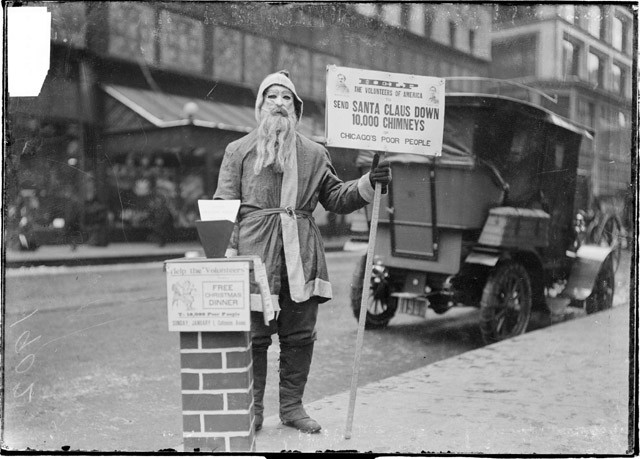
You know what seems to start earlier with each successive year? Not the inescapable presence of Christmas music, although they were already playing that at a CVS I stopped into this weekend, which, fuck you, CVS, I should not have “Silver Bells” clanging up and down in my brain even one day more than necessary. No, it’s the pervasive feeling of holiday dread that seeps into the psyche of everyone who is not still entranced by “the most wonderful time of the year.” (Yeah, CVS nailed me with that one too.)
You know what I’m talking about. You see it in the sagging shoulders of the woman wheeling her luggage to the cab that will carry her to the airport and all its attendant miseries. You hear it in the voices of the drunk couples who like to fight in the street but suddenly lack the boisterousness of summertime’s shoutfests, as if they can’t be bothered to fully engage in the kind of conflicts that passersby can enjoy without quite understanding. You read it in the resigned notes from friends and colleagues who you are making plans to “catch up with” during December. Everyone is going through the motions, and everyone knows it.
Why? Well, surely there’s the recession. Nobody’s happy. But there is also the recognition that the holidays suck; they are a dark vortex of depression and discomfort and loneliness and remorse, with the added bonus of hangovers and weight gain and the crushing feeling that you’re doing it wrong — the holidays, that is, but, in a larger sense, life in general. Your heart hurts.
Some of your neighbors are already leaving for Thanksgiving, if they have not left already. You spot them near the elevator and pretend that you’ve forgotten something in your apartment so that you don’t need to spend a short ride in their company expressing cursory interest in their plans. They are just as grateful to not have to talk to you. We’re all wondering how we’re going to keep it together until January puts an end to another year.
Well, buck up, people! I know it’s hard, but I want you to delay your holiday dread for as long as you can. Drink yourself calm, ignore the imagined — and real! — slights, believe whatever lies that somehow convince you things won’t be as terrible this time out. Yes, it’s the most miserable season of all. Yes, it’s a stark reminder that you’re that much closer to death. Yes, the memory of your childhood glee is that much more painful when contrasted to your adult reality. But be easy on yourselves. It is not even Thanksgiving yet. Christmas is a long way off. Give yourselves a break. Come those weepy days of December you’ll be glad that you made the effort.
